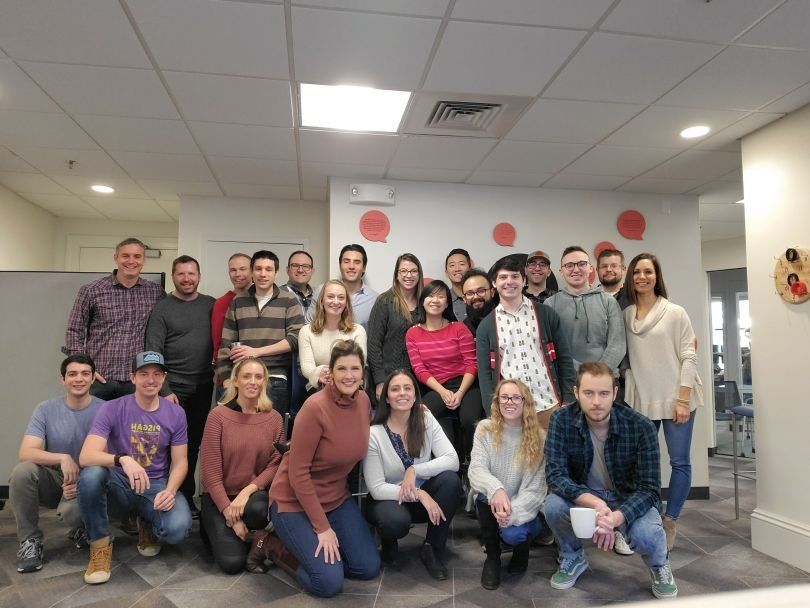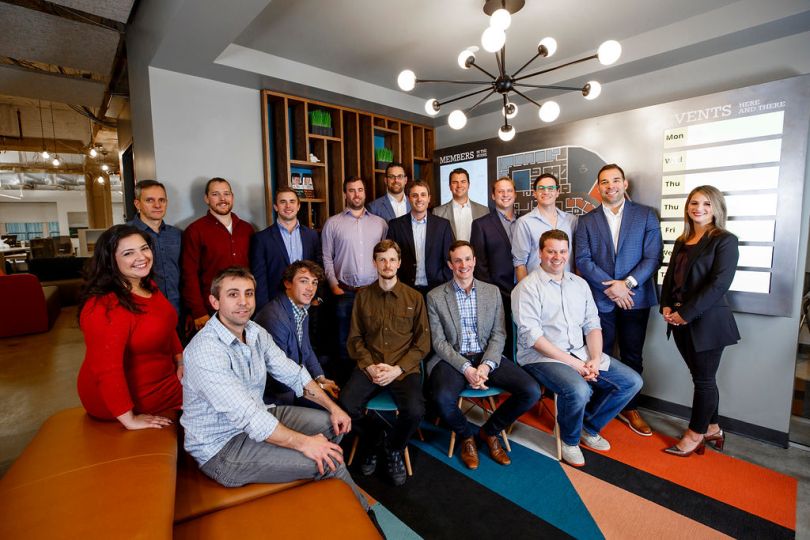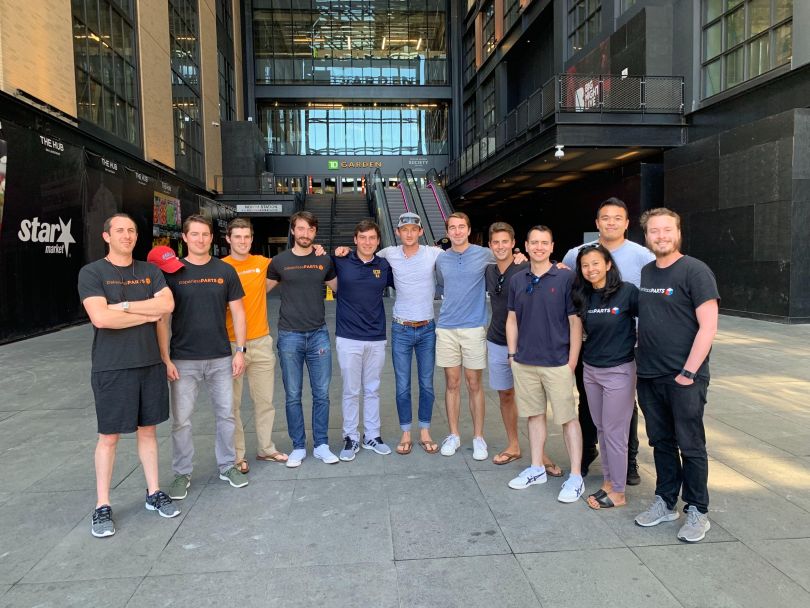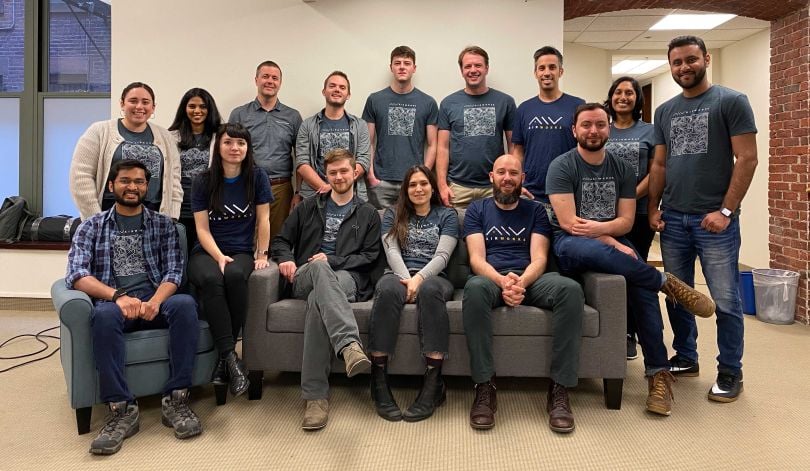The following 50 startups represent local tech companies — less than three years old — that are poised for a promising future. Our list includes a blend of first-time founders and serial entrepreneurs looking to make impacts in surgical operations, quantum computing, blockchain and more.
Top Boston Startups to Know
- Hometap
- Hopjump
- mabl
- Marigold Health
- Neural Magic
- NeighborSchools
- Paperless Parts, Inc.
- Starburst Data

How do you make something as archaic as insurance disruptive and cutting edge? With a mission to better inform insurance brokers, Corvus Insurance uses cyber-risk data to help brokers analyze documents and manage risk pertaining to their clients. By using data-driven underwriting technology and AI, brokers can better prevent and mitigate risks. With more than $46 million in funding, Corvus hopes to push the insurance industry into the modern age.

Customers don’t like to be guinea pigs, especially when it comes to testing new software. Mabl’s DevOps platform takes customers out of the trial-and-error process by automating UI tests. When mabl finds an issue, it flags the step where the problem occurred and sends a screenshot to the development team, indicating where they can analyze and repair. Co-Founders Izzy Azeri and Dan Belcher, who also founded monitoring-service company Stackdriver, raised a $20 million Series B round of funding from Google Ventures in September 2018, which will go toward building out the sales, engineering and customer success teams.

For the frequent traveler, benefits from airline allegiance include free miles and seat upgrades. For hotel chains, the same benefits apply but at the cost of restricting travel plans to locations where the hotel is offered. SmarterTravel is a travel tech startup that lets travelers book hotel deals through its site and offers membership benefits for repeated use, regardless of hotel company. Launched from incubator Cogo Labs, SmarterTravel now offers targeted travel recommendations and discounts to over 700,000 hotels around the world.

After getting into fender benders, the last thing drivers want to do is wait on the phone for someone to process their claim. With Hi Marley, communicating with insurance companies just got more personal by way of texting. When insurance carriers sign up for Hi Marley, their customers can contact customer support through an AI-enabled texting platform. Hi Marley closed a $8.7 million Series A funding in June 2019.

According to Magnify Money, 40 percent of mortgages originated with banks in 2018. But working with banks has its own challenges in terms of accessing loans, managing credit scores and navigating interest rates. With Hometap, homeowners can access cash from the equity they’ve accumulated on their homes by selling a percentage of the equity in their homes to Hometap. When the home sells or the homeowner settles the investment, Hometap is paid out an agreed-upon percentage of the sale price or current appraised value. The company uses automated technology to streamline the process and offers proprietary financial models and forecasting tools. The startup raised $100 million in Series B funding in December 2019.

Starting an ecommerce business is one thing — growing and scaling is another. For those looking to see their retail company last into 2021, Thrasio provides a quick solution. Thrasio’s technology buys small businesses and operates them as third-party brands that utilize Amazon’s fulfillment platform, completing the transaction in under 45 days. In December 2019, Thrasio raised $20 million in funding, allowing future entrepreneurs to receive their payday.

Cryptocurrency can be confusing, even for the experts. Every reason behind a sudden value drop or raise is a learning opportunity for investors as they navigate the burgeoning field. Flipside Crypto aims to translate the crypto market for new investors. The startup provides analytic tools that measure the health of cryptocurrency behavior. Flipside Crypto has raised $11.5 million in seed funding to date.

In 2012, Facebook built Presto, an open-source SQL query engine survey for anyone to use. To make Presto applicable for consumers and businesses, Starburst is adding premium security features, like role-based access control, a management console and connectors to enterprise systems like Teradata, Snowflake and DB2. The startup raised a $22 million Series A in November 2019, and with that, Starburst plans to build out its sales and marketing teams as well as expand its engineering department.

According to the Center for Disease Control and Prevention, 5 percent of all adults will develop colon cancer in their lifetimes. In addition, doctors miss 25 percent of all polyps, making the need for an extra eye from computer vision crucial. To help diagnose this disease, Iterative Health provides gastroenterology doctors with computer vision and machine learning technology that detects and categorizes polyps in real time. Iterative Health was incubated at MIT and, with recent funding from Tau Ventures, hopes to decrease the mortality rate of colon cancer patients in the future.

Most parents looking for childcare services have to rely on word of mouth or trust reviews on caretaker websites. And when it comes to finding an early childcare provider, the search can be twice as intense. NeighborSchools is trying to make the search easier. Like the Airbnb for early childhood care providers, NeighborSchools helps parents find vetted childcare educators. It also helps educators open child care businesses within their homes by helping them navigate government regulations, marketing and business operations. In November 2019, NeighborSchools raised $3.5 million in seed funding to expand its team and bring affordable daycare to neighborhoods.
For those struggling with substance use and mental health issues, getting support is critical. Marigold Health’s social platform connects people seeking outpatient care with mental health care providers via text in small chat groups. Using AI, critical messages are filtered to the top of the queue for mental health providers to address. The startup originated at John Hopkins University and has $2.3 million in funding.

When a company forgets to renew its cold brew contract, employees might be irritated to wait a couple of extra days for delivery. For companies operating on software subscriptions, the results of a forgotten renewal could be much worse — they could face a stall in operations, a drop in sales, a loss of data or something else entirely. Vendr aligns with a scaling company’s software goals and handles renewal conversations with vendors to save time, money and headaches. Its most recent funding was $2 million in October 2019.

Apple iOS helps many developers create their apps, but when it comes to implementing AI, some developers are left scratching their heads. In terms of mobile apps, Fritz AI is making it easier to integrate AI into existing projects. Features such as image detection, pose estimation and style transfer can be added to apps with just a few lines of code. The company raised $2 million in seed funding to grow the team and offer instructional blog posts on how developers can implement AI into their apps using Fritz.

There’s more than one way to operate a manufacturing business, but the software companies use isn’t always so flexible. At Paperless Parts, there is no one-size-fits-all when it comes to manufacturing businesses. The company’s management platform helps streamline and simplify machine shop operations according to a company’s preference. Paperless combines integrations with existing on-premise enterprise resource planning and accounting software with front-end operations, shop floor management and buyer-facing technology, enabling manufacturers to focus on revenue, operations and a better customer experience. The company raised $3 million in January 2018.

Poor lighting, bad eyesight and adverse weather conditions can affect what people see outside — the same can be said with cameras. BlinkAI provides software that enhances camera imagery for the automotive, mobile and security industries. Two funding rounds and $2.5 million later, BlinkAI’s lenses can now magnify and lighten images by up to five times to improve image quality and computer vision performance.

A 2017 study by Purdue University found that an average of 251,000 deaths in America were due to medical errors. Activ Surgical is using robotics to help reduce that number. Its patent-pending software platform, powered by computer vision and AI, seeks to improve surgical operations, accuracy and patient outcomes. In 2020, the company, which has raised more than $25.4 million in funding, is hoping to launch ActivSight — a platform that will allow robot-assisted surgeries to be performed on humans.

For many architects, an arduous part of planning is surveying land. Airworks wants to change that through software that converts satellite or drone photos into computer-aided design (CAD) site plans, speeding up surveying time by weeks. The startup said digitized CAD site plans enable architects to better map out linework and topography for future sites. Airworks is also creating a centralized database of CAD site plans for architects to use for reference. The company raised a seed round of $2.5 million and recently released the platform to its first batch of waitlist customers.

Quantum computing can seem like a secret club: It looks exciting, but in order to get in, aspirants have to know somebody. Aliro Quantum Technologies tears off the velvet rope with its new platform that allows all developers to easily code for quantum environments. Aliro, which started in Harvard University’s NarangLab, raised more than $2.7 million in its latest seed round. The team is already working with the likes of IBM and Rigetti and hope to use the funding to attract even more partners.

Audiolex wants to help kids become more confident public speakers with a software development kit that helps children struggling with speech and language development. Its technology offers speech transcription and recognition tools that parents and teachers can use to work with individual children and their speech patterns. The startup participated in the 2019 MassChallenge Boston cohort and will continue to raise funding after graduation.

As machines become more sophisticated, so does the complexity of the interfaces that control them. To help humans interact with autonomous tech in high-risk, high-priority situations — like those used in some robots and vehicles — Awayr AI is developing human-machine interface (HMI) technology. The Air Force recently chose Awayr to study interface design, human-machine teaming and swarming in relation to unmanned systems.

Bensen AI says restaurants lose 10 percent of sales to unanswered calls every day. With Bensen AI, future customers won’t be calling at all. Working with quick-service restaurants, Bensen can upload a restaurant’s ordering system to voice platforms like Alexa and Siri. Its software allows customers to place an order through the Bensen voice platform via text and transfer it to the same channel where the restaurant receives web orders.

When it comes to analyzing year-over-year sales, numbers only tell one side of the story. For stores wanting better insight into the “why” behind their sales, Blueday claims to have the answer. By analyzing year-over-year sales numbers, past performance and conversion rates, BlueDay’s AI-powered software generates personalized plans to increase sales, traffic and customer conversion. Personalized coaching then helps store managers recolor the bottom line black.

Emails can be sent to all browsers regardless of their service platform, whether that be Gmail, Yahoo or Hotmail. Centre believes cryptocurrency and finance should operate the same way, which is the reasoning behind its decentralized crypto-powered consumer payment network. With Centre, money can flow between digital wallets regardless of the source. Centre has raised $40 million in seed funding, hoping to become a leading digital wallet of the future.

When googling the meaning of life, answers at the top of the page are going to be the ones with the highest SEO ranking — not necessarily the sites with the most credited sources. Considdr thinks search engines should operate differently. The startup is reimagining how knowledge gets uncovered, validated, shared and managed by aiming to return insights, not just links. Its patented AI platform crawls thousands of sources, delivering relevant insights in seconds. These insights include hard evidence and factual data points, expert analysis and opinions from reputable sources. In 2019, Considdr was selected to participate in the MassChallenge Boston Accelerator.

Dexai Robotics’ robot “Alfred” might be able to alleviate some of the common pain points in commercial kitchens. The flexible robot arm can assemble food recipes using utensils to scoop and pick ingredients with precision and speed. The arm is powered by machine learning and computer vision, which can manipulate food items as humans can, and is National Health Service-certified to work in commercial kitchens. Born out of Draper Labs at MIT, Dexai launched in 2018 and raised pre-seed funding in May 2019.

In 2018, PitchBook data showed that only 2.2 percent of venture capital went to companies founded solely by women — meaning these women-owned businesses rely on consumers, not investors, to thrive. For consumers interested in supporting women-led businesses, Dough’s subscription service eliminates the guesswork by sending users a monthly box of goodies developed and sold by women. Members get new products and businesses get exposure and profit — a win-win for the women-led workplace.

College should be a gateway to financial freedom, not a financial burden. Edmit helps families make smarter financial decisions about higher education by matching a student’s financials with colleges within their budget. Founded by Nick Ducoff and Sabrina Manville, Edmit estimates a savings of $5,000 per student — about the cost of one accounting class.

Every industry is always looking for new ways to keep spending costs down. Fairmarkit’s solution uses machine learning and artificial intelligence to reduce manual effort by 30 to 40 percent on purchases while yielding savings of up to 33 percent. Through streamlined sourcing, vendor identification and automatic quoting, Fairmarkit accelerates the bid-to-buy process. Fairmarkit raised $11 million in October 2019 and will use the funds to partner with Fortune 500 companies for its AI-powered spend management technology.

Not all entrepreneurs have a flair for interior design. Hello Raye’s online platform allows entrepreneurs to connect with interior designers and office furniture companies to decorate their office spaces. In the app, interior designers can use collaboration tools, access a 3D model warehouse and directly purchase from supplier warehouses. A $5 million funding round supports the claim that upgrading an office from “drab” to “designer” is possible through Hello Raye’s platform.

What does freedom of the press look like in the 21st century? To Inkrypt, it looks like an autonomous, decentralized content-hosting system where journalists can share information without fear of censorship, data breach and latency from government influence or hackers. Before relocating to the United States, all five founders experienced government-enforced censorship of their media. Inkrypt has built a global network of storage nodes and couples them with anonymized nodal communications to form a cyber-secure, censorship-resistant ecosystem. Inkrypt raised $1.3 million in seed funding in 2018 and hopes to use the financing to continue lifting the veil of censorship for journalists around the globe.

“Can everybody hear me?” For anyone who has ever had to join a video conference, it’s a familiar phrase. With Katai, video hangouts get an upgrade. The startup’s proprietary technology offers high-quality, 360-degree video from a single camera. Built-in AI can detect facial features and track active speakers. Evolved from military technology, Katai is expanding its offerings to smart homes, city surveillance, autonomous vehicles and next-generation retail markets. Katai has raised $3.6 million in seed funding and is currently being tested at Zoom, Skype and BlueJeans.

Between classes, exams and extracurriculars, college students don’t have time to call the student help desk every time they have pressing questions. N-Powered LLC partners with universities and uses AI technology to answer regular student questions in the context of each university. “Library” means the student library, “class” refers to the student’s personalized schedule, and “quad” isn’t a shape but a location. After a 60-day pilot run at Northeastern, the campus call center saw an 80 percent drop in calls from students. Since 2018, n-Powered has partnered with Northeastern full time, alongside four other universities — saving thousands of dollars annually in personnel costs.

It's only a matter of time until self-driving cars upend the transportation industry. Using LiDAR (light detection and range) technology, NODAR (Native Optical Detection And Ranging) makes 3D sensors for autonomous vehicles, helping them change lanes. The sensors measure distances to a target by illuminating the target with laser light and measuring the reflected light with a sensor. NODAR’s patented technology can be adapted in autonomous vehicles such as cars, boats and drones. In 2018, they were selected to participate in the MassChallenge Boston 2019 Accelerator.

Unstructured physician language can be difficult for software to process. Nym hopes to solve this pain point through its fully automated and transparent revenue cycle management for health care providers, which uses AI to auto-code medical charts it fully understands, leaving any sticky sections to the human coders. According to Nym, its auto-coding reduces operational expenses, accelerates payment cycles and maximizes audit-readiness. Nym’s CLU-based coding requires zero human intervention and no human training, which means it can be quickly adapted and implemented in hospitals of every scale.

ObjectiveEd’s mission is to provide students with vision impairments with digital curriculum, integrated performance monitoring and reporting tools that will help students succeed. Its curriculum enables students to learn faster and master skills independently while allowing teachers to make progress on new curriculum instead of repeating lessons. For Founders Bob Voelk, Luke Voelk and Marty Schultz of eSped Inc. and Blindfold Games, this is their latest venture to progress education for those who need a personalized approach.

Customer feedback helps engineers create better software updates, but if they’re unable to track complaints, they won’t know what to improve. Parlor.io makes it easier for software developers to get more insight from consumer feedback beyond a list of bugs. Through the Parlor platform, consumers can validate the impact of new features and fill out surveys about what matters most to them. After two funding rounds totaling $2.8 million, Parlor.io plans to expand its team and partner with more companies in the coming year.

Playeasy Founder and CEO Sean Flaherty, along with four other co-founders (who have all played professional or collegiate sports), built an app that could be thought of as the Opentable for athletic spaces. Whenever users want to practice or play their sport of choice, they can use Playeasy to reserve everything from public basketball courts to skating rinks to soccer fields. The growing company recently spent its summer as part of the inaugural class at the Techstars Sports Accelerator Powered by Indy and will be focusing on fundraising and expanding its offerings in 2020.

According to Pliant.io’s website, 30 percent of an IT department’s time is spent on easily automated tasks, such as remediation management. But with Pliant.io, companies can automate repetitive business and IT administrative tasks. By transforming API code into low-code building blocks, Pliant.io claims to decrease the automation process from weeks or months to minutes. The team raised $2.5 million in funding in May 2019.

Pyxai is a soft skills and culture fit analytics tool that helps organizations recruit, retain and develop new talent. They help organizations increase company culture, develop people and strengthen business performance through soft skills and culture fit pulse-assessments. This proactive approach empowers businesses to quickly uncover risks and opportunities which facilitates effective action. Pyxai achieves this through simulations of real-life situations to extract meaningful insights from a company’s culture and how employees execute company mission and vision. Similar assessments are given to job applicants to find and match talent to company values, while reducing unconscious biases and identifying overlooked talent. The Y Combinator-backed company has performed more than 10,000 employees and candidate assessments as of Q4 2019.

As the tech industry invents new robotics, some companies, like Southie Autonomy, are inventing ways to reuse them. Southie Autonomy develops software that enables any industrial robot to be repurposed and re-deployed by any person regardless of robotics expertise or computer skills. Think of the Terminator programming in the body of an old R2-D2. It aims to help businesses recoup ROI faster by lowering time, cost and skill barriers in applications like kitting, palletizing and simple assembly.

Stuff, formerly known as “Delegate,” aims to be a one-stop-shop for an individual's personal tasks. The startup is committed to completing all tasks with the same (or better) quality that a person could do alone, and to make it as seamless a process as possible. Think: planning vacations, scheduling home repairs, locating a dog sitter, booking a Broadway show and more. Delegate does this by pairing AI with human labor. Delegate is backed by Vertex Pharmaceuticals Founder Josh Boger, Kronos CEO Aron Ain, and other VCs and investors.

Between conflicting parenting books and unsolicited advice from in-laws, it’s hard for parents to get straight answers on child-rearing best practices. For millennial parents used to having answers at their fingertips, Tinyhood wants to become the go-to app for parenting techniques in the ever-growing baby tech market. Its platform matches new parents with one-on-one consulting experts and hosts moderated communities led by parenting experts on topics like breastfeeding and sleep schedules. Tinyhood raised a $1.5 million Series A in February 2017, which means no more googling in the middle of the night about why your kid won’t go to sleep.

Buying a home is an objectively stressful process (think: pending contracts, endless paperwork, and much more). With Torii, prospective homebuyers can close on a home from their phones. Torii provides services at every step of the way, including attorneys, appraisals, inspectors and an online agent to guide homebuyers through the process. After raising $1.2 million in seed funding, Torii’s next move is to expand outside the Massachusetts market and go national.

When a company suffers a major data breach, its clients lose more than their exposed data — they lose trust in the company. Founded by two former Brown classmates, Seth Proctor and Peter Shah, Tranquil Data’s software monitors and protects data that lives within private corporations. The startup does this by capturing business-relevant facets of data and enforcing rules around those facets, making the software adept at identifying each user’s data, isolating users from each other and sharing segments based on business context. The company exited stealth mode in 2019.
What’s the difference between an Olympic athlete and a vice president of sales? At Valor Performance, not much. Valor Performance is a digital learning platform that trains managers and executives to sustain their peak performance. Armed with progress metrics and performance insights, each subscriber partners with a coach and receives an individualized program so they can provide gold-medal management. In 2019, Valor hired 12 Olympic and professional athletes to become Valor-certified business performance coaches and signed on clients, including executives from LinkedIn and HubSpot.

It’s important for brands to have the same campaign message across different mediums, but it can be difficult for them to upload that message to various voice assistants, all of which have different requirements. With Voicify, companies can create engaging voice applications and easily deploy that message to different voice assistants like Google Home, Alexa and Siri. The startup raised $2 million in Series B funding in May 2019.

Wevo wants to answer this catch-22: How do you get user feedback before making your website live for users? With Wevo, developers can upload their site to Wevo’s platform and define their audience. Wevo then creates a panel of 150 people who best match criteria set from more than 170 filters to test the uploaded site. From there, Wevo filters and scores the crowdsourced visitor insight to generate recommendations that help optimize the website before it goes live. Wevo has raised $3.6 million through two rounds of funding.

Labeling data isn’t for everybody — but for some, it can be a lifeline to a better life. WorkAround connects refugees from around the world with companies looking to hire them for remote administrative roles that prepare company data for machine learning platforms. Using AI technology, WorkArounders help with data labeling and annotation so that an employee’s time can be spent elsewhere. In return, refugees have access to an income, and all they need are their phones. In 2019, WorkAround received two rounds of angel funding.

In the healthcare industry, communication between software can get confusing. Zeleo acts as a sort of Rosetta Stone between all healthcare software, working to help them speak the same language. By combining software services and IoT healthcare integrations on one platform, teams can be on the same page, even when operating on different systems. The company has already partnered with AxisPoint Health and MDLogix to automate workflows and aims to save hospitals $60,000 annually on readmission costs.
About Built In Boston’s 50 Startups to Watch in 2020
Annually, Built In Boston hand-selects startups that have the vision, team, focus and funding to drive innovation within the tech community. For our 50 Startups to Watch in 2020 list, we chose local companies founded within the past three years that we believe have positioned themselves for rapid growth and scaling in the year to come.



